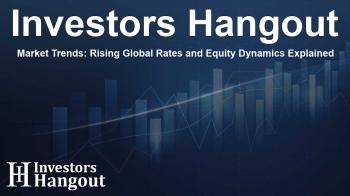Market Trends: Rising Global Rates and Equity Dynamics Explained

Understanding Global Rate Dynamics
Recently, the financial landscape has shown intriguing movements, with the global rates advancing notably amid decreasing demand for equity leverage. Observing key indices reflects that the current climate remains cautious yet revealing significant trends worth noting.
S&P 500's Steady Stance
The S&P 500 concluded the day relatively unchanged, with a modest gain of 16 basis points. This stability is crucial as market participants keep a close eye on the significant 5870 level, regularly tested but yet to be breached. If this level is compromised, it might catalyze a larger downturn, potentially marking a gap lower on future trading days.
The anticipation for the upcoming jobs report adds another layer of interest as investors typically square their positions prior to such announcements. This was evident in the volatility index's behavior, which noted a rise ahead of the news on equity markets.
Upon the release of economic data, implied volatility generally sees a sharp decay, leading to a favorable adjustment for market makers who often hedge their positions. Frequently noted is that while the markets might react positively post-announcement due to these adjustments, this uplift is typically short-lived.
Options Activity Creates Ripples
Analyzing options data for upcoming expirations sheds further light on market sentiments. The significant volume of put options at various strike prices indicates a defensive posture among traders, seeking to protect against potential declines. This unusual behavior reflects a cautious outlook amid fluctuating market conditions.
The Global Rate Landscape
Shifting focus globally, key markets such as the UK and Japan are witnessing noteworthy upward movements in their respective yields. The UK’s 30-year rate recently surged to 5.37%, breaching an upward trend, while the 10-year yield has reached its highest point since July 2008. In the case of Japan, the 10-year yield has also spiked, marking the highest level observed since June 2011. Such trends suggest an evolving narrative for interest rates worldwide.
As these adjustments unfold, the performance of the Chinese 10-year yields stands in contrast, edging down to 1.61%. This divergence raises questions about China’s maneuvering in the financial markets, particularly regarding the management of its currency.
Impact of Currency on Global Markets
The fluctuations in the Chinese yuan present a compelling scenario. As the currency approaches the upper limit of its trading range, it conjures speculation about potential measures China might employ, like selling U.S. Treasury bonds to stabilize the yuan. Such actions could lead to wider repercussions in global markets, particularly if the USD/CNY pair surpasses critical levels.
Moreover, the ongoing volatility in the cryptocurrency market, notably with Bitcoin seeing significant dips, could signify shifts in liquidity and investor confidence. The potential head-and-shoulders pattern on Bitcoin charts indicates underlying concerns that could affect not only the cryptocurrency space but traditional markets as well.
Equity Financing Trends
Interestingly, the landscape for equity financing has also witnessed changes, highlighted by a considerable drop in financing costs recently. In particular, the S&P 500 total return futures have experienced a notable decline from the Fed funds rate, igniting discussions around the fading demand for leverage in equity investments.
As traders navigate this dynamic environment, a combination of rising rates and subdued equity leverage demand paints a complex picture for future market behavior. Maintaining a watchful eye on these developments will be crucial for all market participants.
Frequently Asked Questions
What are the implications of rising global rates on equity markets?
Rising global rates often lead to decreased demand for equity leverage, influencing investor behavior and market trends.
How does volatility relate to market movements?
Implied volatility changes typically cause market makers to adjust hedges, potentially leading to temporary rebounds in equity markets post-announcement.
What does the performance of the S&P 500 indicate?
The stable performance of the S&P 500 amidst rising rates reflects a cautious sentiment among investors while keeping an eye on critical support levels.
Why are changes in the Chinese yuan significant?
Fluctuations in the Chinese yuan can impact global financial stability, especially if they lead to strategic currency interventions by the Chinese government.
What are the prospects for equity financing in the current climate?
Equity financing costs have dropped, indicating a reduced appetite for leverage, which could alter investment strategies moving forward.
About Investors Hangout
Investors Hangout is a leading online stock forum for financial discussion and learning, offering a wide range of free tools and resources. It draws in traders of all levels, who exchange market knowledge, investigate trading tactics, and keep an eye on industry developments in real time. Featuring financial articles, stock message boards, quotes, charts, company profiles, and live news updates. Through cooperative learning and a wealth of informational resources, it helps users from novices creating their first portfolios to experts honing their techniques. Join Investors Hangout today: https://investorshangout.com/
Disclaimer: The content of this article is solely for general informational purposes only; it does not represent legal, financial, or investment advice. Investors Hangout does not offer financial advice; the author is not a licensed financial advisor. Consult a qualified advisor before making any financial or investment decisions based on this article. The author's interpretation of publicly available data presented here; as a result, they should not be taken as advice to purchase, sell, or hold any securities mentioned or any other investments. If any of the material offered here is inaccurate, please contact us for corrections.
